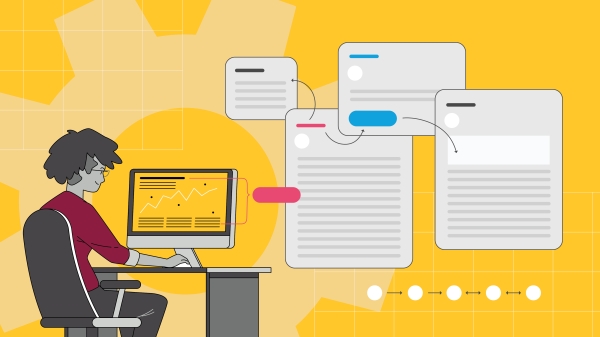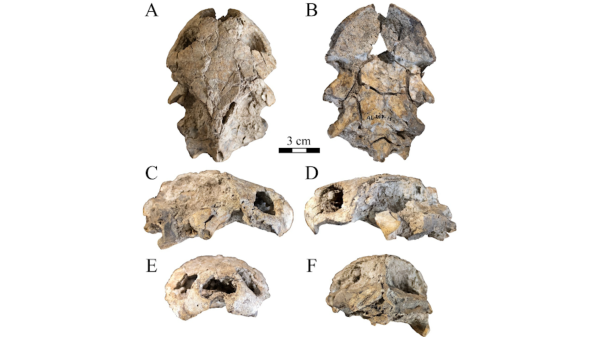Editor’s note: This story is featured in the 2023 year in review.
Arizona State University has reimagined the way that biology will be taught, using a curriculum that focuses on real-world skills, such as problem-solving, and prioritizes student success.
The personalized curriculum, called NeoBio, combines skills-based lessons with the narrative-driven Dreamscape Learn virtual reality lab experiences, which were introduced last year.
NeoBio, which will launch in the fall 2023 semester with Biology 181, uses an adaptive learning platform, which constantly tests students and allows them to review and reinforce any skills that were not mastered before proceeding.
The goal is to instill a consistent level of competency for all students, according to the two leads on the project: Michael Angilletta, President's Professor in the School of Life Sciences and associate dean of learning innovation at EdPlusEdPlus is an enterprise unit for Arizona State University focused on the design and scalable delivery of digital teaching and learning models to increase student success and reduce barriers to achievement in higher education. , and John VandenBrooks, professor in the College of Integrative Sciences and Arts and the associate dean of immersive learning for EdPlus.
“With NeoBio, students learn not just biology skills but higher order quantitative skills, meta-cognition and problem-solving,” VandenBrooks said.
“Not everyone who majors in biology will go on to a related field, and these are transferable skills that serve any student in their future career.”
Work on the initiative started more than five years ago, when faculty in the School of Life Sciences were building an online biology curriculum and realized that uniformity was needed between online and on-campus courses, and also across sections, because instructors were emphasizing different concepts.
So the faculty began meeting over many months to determine the best way to create a curriculum to meet learning outcomes and goals.
“They talked about what they thought was important, and it took some time to agree but they coalesced around a vision,” Angilletta said.
VandenBrooks said that one goal was a consistent level of competency for all students.
“We took a step back and said, ‘What do our students need to be successful?’” he said.
Rather than each instructor building a course in Canvas, NeoBio has master class modules, delivered digitally, that adhere to the best practices in education.
“Students are getting the best version of any particular lesson no matter what course section they’re in,” Angilletta said.
One key to NeoBio is the adaptive learning component, built on the CogBooks platform. A typical course — one that doesn’t use this adaptive component — might include a series of lectures and a big exam.
“What’s more effective is a lot of smaller, low-risk assessments used to practice and get critical feedback on the ability to do things, such as apply a concept or a skill. Those are formative assessments that lead up to an exam,” Angilletta said.
Instead of 50-minute lectures, courses in NeoBio have five- to 10-minute video modules that are focused on specific exercises linked to the lesson.
“We can immediately assess whether the student understood and can apply what they just learned,” Angilletta said.
“It’s all built in a platform that not only connects within a course but also between courses.”
The continual assessment reinforces skills and provides deliberate practice for students.
“CogBooks can determine that when you got back from spring break, you didn’t remember how to do something, so it takes you back and enables you to practice,” he said.
“And later in the curriculum, with 300-level courses, CogBooks will take you back to concepts or skills from a 100-level course.”
Students take a pre-test at the beginning of a course, and the platform determines whether they can skip ahead or get a refresher.
“When students come to class, they can spend time practicing high-level problems or addressing misconceptions. CogBooks tells the instructor which principles the students have the most trouble with,” Angilletta said.
The Dreamscape Learn lab experiences boost engagement while also teaching those problem-solving skills.
“We need to find ways for students to apply skills to novel problems worth solving that they can’t just Google the answer to,” VandenBrooks said.
“In the past, we would use a medical or ethical case study. Now, we can take that to the next level with Dreamscape Learn. The Dreamscape narratives are built so that students feel like they’re actually scientists and applying quantitative and reasoning skills to a problem.
“This approach allows us to level the playing field because no student has ever solved a problem in Dreamscape Learn before. Everyone is starting from the same place.”
Casey Evans, chief growth officer and chief operating officer for EdPlus, said that NeoBio will empower students.
“When we think about the success of our learners, which is the center of everything we do, we know we need more STEM-credentialed students. The job market is leaning heavily toward STEM,” she said.
“How can we ensure that they not only begin a degree but also successfully complete a degree?
“The key is adaptive technology that allows students to not be perfect and to learn going forward. NeoBio helps to create persistence in our learners as they realize they can move forward and be successful.”
The new curriculum aligns with the university’s mission to create lifelong learners, she said.
“Truly what NeoBio is trying do is teach people how to learn, so they can learn anything anywhere.”
More Science and technology

New research by ASU paleoanthropologists: 2 ancient human ancestors were neighbors
In 2009, scientists found eight bones from the foot of an ancient human ancestor within layers of million-year-old sediment in the Afar Rift in Ethiopia. The team, led by Arizona State University…

When facts aren’t enough
In the age of viral headlines and endless scrolling, misinformation travels faster than the truth. Even careful readers can be swayed by stories that sound factual but twist logic in subtle ways that…

Scientists discover new turtle that lived alongside 'Lucy' species
Shell pieces and a rare skull of a 3-million-year-old freshwater turtle are providing scientists at Arizona State University with new insight into what the environment was like when Australopithecus…

